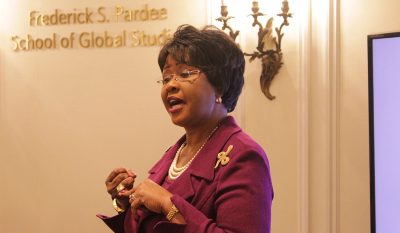
In a small room inside an ivy-covered brownstone, a woman’s voice echoed off marble floors. She wore a bright magenta suit that stood out among a cluster of navy and black. Arikana Chihombori-Quao had the floor.
The doctor and African Union Ambassador to the United States was invited to Boston University’s Frederick S. Pardee School of Global Studies as part of the Policy Leaders Forum speaker series.
Students, faculty and members of the general public were all welcome to attend a dinner hosted by the school and hear Chihombori-Quao speak about the AU’s ideas for future policy in the continent.
BU professors of African Studies, the dean of Pardee, students and a local shop owner originally from Senegal were all in attendance. During the talk, Chihombori-Quao discussed the Berlin Conference of 1884–85 and its lasting effects that contributed to many current issues in Africa.
At the Berlin Conference, leaders of European countries that were powerful at the time divided the continent into the nations that are still there today.
“Those boundaries are not ours, and they must go,” the ambassador said during the talk.
Chihombori-Quao said that Africa is the wealthiest continent in terms of natural resources. She recounted growing up in Zimbabwe and watching methane gas bubbling from the ground. According to National Geographic, as of 2008, Africa produced 55 percent of the world’s diamonds and 22 percent of the world’s gold.
The ambassador said during the talk that she looks forward to the future relationship between the African Union and the United States once borders are dissolved and Africa can economically engage with the world. However, Chihombori-Quao said that there is a lot of work to be done before Africa can integrate, due to cultural differences and the pride of different nations.
“We are so predictable in our inability to get along,” Chihombori-Quao said.
Kate Luongo, an associate professor of history at Northeastern University, focuses her studies on Africa. She said she attended the event at Pardee because she had met the ambassador twice before and was eager to hear more of her views.
Luongo listed the cultural differences in Africa as a major contributing factor to her desire to study the continent.
“I was attracted to the incredible diversity of the African continent,” Luongo said in an interview, “and also the central place of Africa in world history, which often goes understudied and underrecognized.”
Chihombori-Quao said her experience as a doctor shaped how she approaches policymaking and her ability to make quick decisions. She was originally a doctor in Tennessee for 25 years before taking on her role in the African Union.
“I don’t open the door, I blast the door,” Chihombori-Quao said.
Eric Schmidt, assistant director of African Studies at BU, said that after spending a day with the ambassador, one moment stood out — after the BU faculty apologized for hosting her talk on such a hot day, she described the grueling conditions she faced as a doctor.
“She said, ‘Oh, it’s no problem. You know, as a doctor I would be doing surgery on call for three days in a row,’” Schmidt said in an interview. “That was really impressive and not something you expect to carry over for a politician. It’s one of those things you don’t think about when you are considering choosing a doctor to be an ambassador.”
As a native-born African who has lived in the United States for many years, Chihombori-Quao said as part of her vision for the continent’s future, she wants to make the process easier for Africans who have left the continent to return to their own or their ancestors’ place of origin.
Joyce Hope Scott, a clinical professor of African American Studies at BU, said in an interview that through this event and another she attended with Chihombori-Quao, she has learned a lot about the AU’s goals.
“I’ve grown closer to understanding her agenda and have great respect for what she is trying to do,” she said.
Luongo expressed excitement about Africa’s future and said she was grateful for events such as the Policy Leader Forum because they inform more people about Africa’s cultures.
“More and more people are beginning to learn about the dynamism of the African continent,” Luongo said. “They are more interested about what is going on, apart from just pessimistic images from the media.”


















































































































